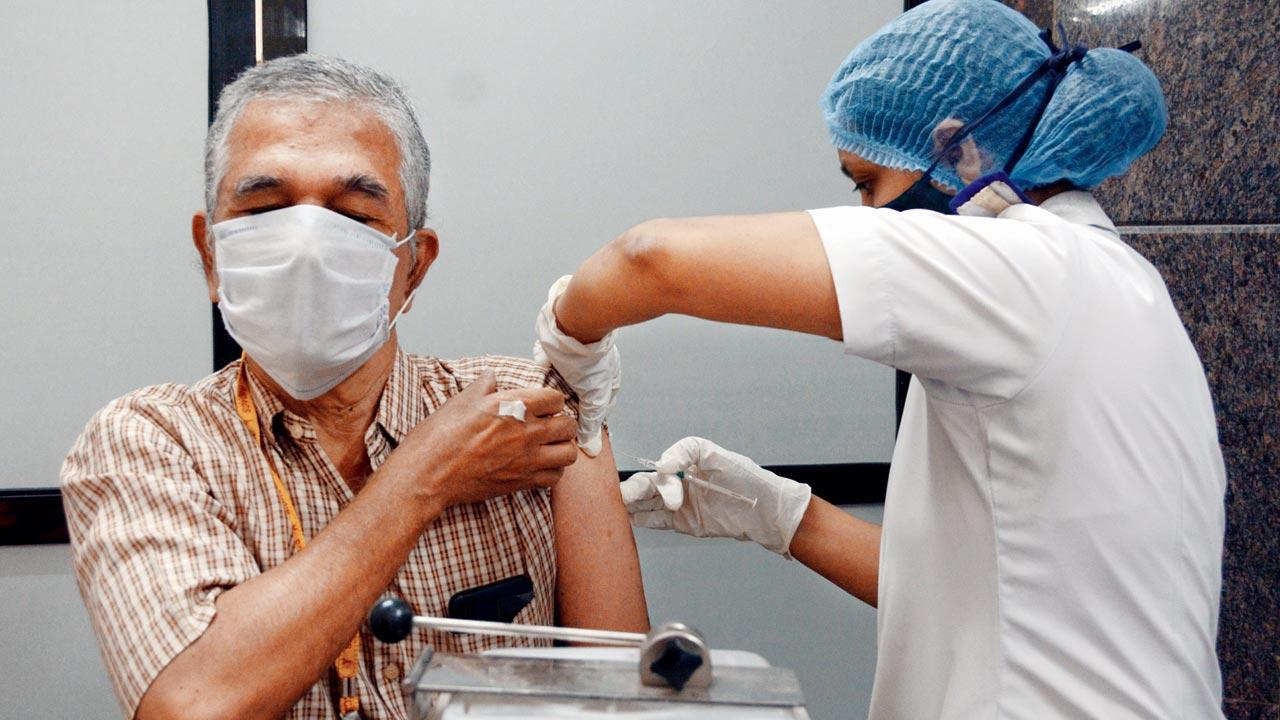Other than Rs 35,000 crore kept for vaccination programme, we are actually going to spend less on health this year than we did in 2020

A health worker gets vaccinated at Bharatratna Dr Babasaheb Ambedkar Municipal General Hospital, in Kandivli. Pic/Satej Shinde
After listening to the finance minister speak about the health budget I was really happy that Rs 2,23,846 crore is allocated for healthcare. On reading the fine print, one is shocked to discover that Rs 60,030 crore for clean water and sanitation, and Rs 2,700 crore for nutrition, which were being spent under other ministries, have now been labelled as health spends.
ADVERTISEMENT
The health ministry spent Rs 78,000 crore last year and the outlay on health this financial year is Rs 71,269 crore. So it’s actually less than what was needed last year.
I wonder if friends in the industry felt a similar roller coaster of emotions after hearing about the R2 lakh-crore-bailout package announced in the Bounce Back Bharat, which just turned out to be a whole lot of bank loans instead of real help to businesses.
I had hoped that the pandemic would be a wake up call for the government and become a landmark moment in Indian healthcare. Indian government hospitals and primary health centres need to be improved. We must spend more on upgrading infrastructure, including hospital wards, operation theatres, intensive care units, neonatal ICUs and provide ambulance services across the length and breadth of the country.
In September last year, I started a petition asking the finance minister to allocate more for healthcare. Almost 2 lakh people signed the petition. Any one reading this article knows the state of public healthcare in India. The sad joke that is an Indian reality – a pizza gets delivered in 30 minutes but no such guarantee for an ambulance if someone has a heart attack or stroke at home.
How many of you have tried getting admitted in a government hospital for a minor procedure? Don’t you wish for them to be upgraded and become at par with private hospitals?
ASHA and anganwadi workers, who work at the grassroots level and ensure all the government schemes for maternal and child health reach the end user, are given a salary of Rs 2,000-Rs 4,500. This is not even one third of minimum wages. Often these workers are not paid salaries for six months at a stretch. If we don’t increase the health budget how do we expect to improve healthcare on the ground? No one can work for free and health services like everything else cost money. I think it is very important that policy makers understand the importance of health in an attempt to improve the economic parametres of the nation.
The Haryana government recently increased the cost of medical education in its government colleges from Rs 4 lakh to R40 lakh with a bond, and the UP government has announced a bond of Rs 1 crore for post-graduates failing to work in government hospitals for seven years. Such kind of tactics will make medicine a less attractive profession for students.
Central council for Indian medicine recently permitted Ayurveda doctors to do 58 types of modern surgeries in the hope that healthcare reaches people living in the peripheries. I had rather hoped that we would work on a blueprint of a healthier Bharat where every Indian got access to quality healthcare irrespective of where they lived. Unscientifically mixing specialities like Ayurveda and Modern Medicine doesn’t seem to be the answer to holistic healing.
India spends about 1.6 per cent of its GDP on health compared to 14-18 per cent in developed nations and 6 per cent in Bangladesh and Sri Lanka. Last year the finance minister had said that they hope to increase it to 2.5 per cent by 2025, but other than the R35,000 crore kept aside for the COVID vaccination programme, we are actually going to spend less on health this year than we did in 2020.
It’s very distressing that the government refuses to learn anything from the pandemic. Maybe the death of 740 doctors and 1.5-2 lakh citizens has not acted as a wake up call to treat health as priority expenditure. Then what will?
Dr. Sarika Verma is an ENT surgeon from Gurgaon
 Subscribe today by clicking the link and stay updated with the latest news!" Click here!
Subscribe today by clicking the link and stay updated with the latest news!" Click here!






